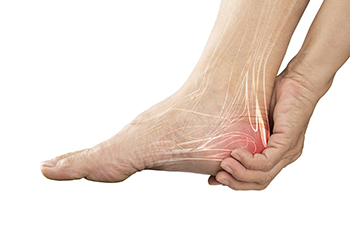
Plantar fasciitis is the most common cause of heel pain. This condition is the inflammation of the tough band of tissue, called the plantar fascia, that runs along the sole of the foot from toes to heel. This tissue helps support the arch and plays an important role in foot mechanics when walking. Causes of plantar fasciitis include standing or walking for long periods, heel spurs, pregnancy, and obesity. Wearing shoes with little or no cushioning in the heel and sole, as well as walking barefoot, may also contribute to the inflammation. The pain of plantar fasciitis is usually a stabbing sensation, felt most in the heel. It tends to be worse upon awakening or after prolonged activity. When pressure is placed on the arch of the foot, pain increases. A feeling of tightness in the calf muscles is another indicator of plantar fasciitis. Luckily, there are a number of remedies for plantar fasciitis. For more information, please make an appointment with a podiatrist.
Plantar fasciitis is a common foot condition that is often caused by a strain injury. If you are experiencing heel pain or symptoms of plantar fasciitis, contact one of our podiatrists from Sutera and Jones Surgical Podiatry. Our doctors can provide the care you need to keep you pain-free and on your feet.
What Is Plantar Fasciitis?
Plantar fasciitis is one of the most common causes of heel pain. The plantar fascia is a ligament that connects your heel to the front of your foot. When this ligament becomes inflamed, plantar fasciitis is the result. If you have plantar fasciitis you will have a stabbing pain that usually occurs with your first steps in the morning. As the day progresses and you walk around more, this pain will start to disappear, but it will return after long periods of standing or sitting.
What Causes Plantar Fasciitis?
- Excessive running
- Having high arches in your feet
- Other foot issues such as flat feet
- Pregnancy (due to the sudden weight gain)
- Being on your feet very often
There are some risk factors that may make you more likely to develop plantar fasciitis compared to others. The condition most commonly affects adults between the ages of 40 and 60. It also tends to affect people who are obese because the extra pounds result in extra stress being placed on the plantar fascia.
Prevention
- Take good care of your feet – Wear shoes that have good arch support and heel cushioning.
- Maintain a healthy weight
- If you are a runner, alternate running with other sports that won’t cause heel pain
There are a variety of treatment options available for plantar fasciitis along with the pain that accompanies it. Additionally, physical therapy is a very important component in the treatment process. It is important that you meet with your podiatrist to determine which treatment option is best for you.
If you have any questions, please feel free to contact one of our offices located in Media, Glen Mills, Riddle Memorial Hospital, and Concordville, PA . We offer the newest diagnostic and treatment technologies for all your foot care needs.



